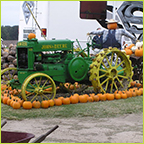- Johnny's Farm Visits & Grower Profiles
- Johnny's 2021 Grower Profiles
- Johnny's 2020 Grower Profiles
- Johnny's Tools Advisor Eliot Coleman: Celebrating Over 20 Years of Partnership | Johnny's Selected Seeds
- Late-Summer Recipe Preview with Farmer-Chef Frank Giglio | Three Lily Farm, Thorndike, Maine
- Johnny's Selected Seeds Visits Martha Stewart's Farm in the Hudson River Valley
- Javier Zamora of Javier Sanchez Medina (JSM) Organics Farms | Royal Oaks, California | Johnny's Farm Visits & Grower Profiles
- Farm Visit: 4-Town Farm, Seekonk, Massachusetts | Johnny's Selected Seeds 40th Anniversary
- Grower Profile: Selwood Green, Walton & Halifax, Nova Scotia, Canada | Johnny's Selected Seeds 40th Anniversary
- Grower Profile: Peach Crest Farm & Cooper Organics, Stratford, Oklahoma | Johnny's Selected Seeds 40th Anniversary
- Farm Visit: Paradise Farms Organics - Homestead, Florida | Johnny's Selected Seeds 40th Anniversary
- Grower Profile: Growing Power Urban Farm - Milwaukee & Madison, WI & Chicago, IL | Johnny's Selected Seeds 40th Anniversary
- Grower Profile: Slegers Greenhouses - Strathroy, Ontario, Canada | Johnny's Selected Seeds 40th Anniversary
- Grower Profile: Gathering Together Farm - Philomath, Oregon | Johnny's Selected Seeds 40th Anniversary
- Grower Profile: Pleasant Valley Farm - Argyle, New York | Johnny's Selected Seeds 40th Anniversary
- Farm Visit: Mark's Melon Patch – Dawson, Georgia | Johnny's Selected Seeds 40th Anniversary
- Grower Profile: Louie's Pumpkin Patch - Skövde, Sweden | Johnny's Selected Seeds 40th Anniversary
- Grower Profile: Living Water Farms - Strawn, Illinois | Johnny's Selected Seeds 40th Anniversary
- Farm Visit: Circle Fresh Farms - Denver, Colorado | Johnny's Selected Seeds 40th Anniversary
- Grower Profile: Freedom Farm - Freedom, Maine | Johnny's Selected Seeds 40th Anniversary
Mark's Melon Patch • Dawson, Georgia
40th Anniversary Farm Visit — April 2013
Mark Daniel started his melon business in his junior year of high school, growing 5 acres of watermelons on his family's row crop farm in southwestern Georgia. He set up a pile of watermelons under a pecan tree on the side of a busy state highway and called his business Mark's Melon Patch. To a 17-year-old, the money was great.
For the next five years, finishing high school and then four years at the University of Georgia, Mark grew melons in the summers with the help of his Uncle Jon and late father Tom. In the fall of 1986, his B.S. in Agriculture in hand, he started interviewing for jobs — and suddenly realized that his heart was in farming.
"It had never entered my mind that I was going to do this as a living," he says. "I was going to be an ag engineer. But when I started looking for jobs, the idea of working for somebody else just didn't interest me. So I've been doing this for 32 years now."
Mark's Melon Patch is still located under that same pecan tree, but it's a much different operation. He now has a permanent market that is open year-round. He still grows melons, and lots of them, but he now has 70 acres in production of a wide array of crops including sweet corn, watermelons, cantaloupes, blueberries, okra, peanuts, pecans, and pumpkins.
Tourists and Locals
Because of its location on State Highway 82, Mark's Melon Patch carries a selection of products for people who are just passing through and not able to buy a lot of fresh produce. There are numerous value-added products such as jams, jellies, syrup, pickled vegetables, and BBQ sauce. Ornamentals also are popular — gourds sell well to crafters who paint and carve them and to bird-lovers who turn them into birdhouses.
About half the market's customers are travelers from outside the area, and many of them are unfamiliar with Southern crops. So Mark offers some unexpected items like cotton, both on the stalk and as bags of cotton bolls. Many travelers don't even know how cotton grows, so taking home a cotton plant is a great souvenir. Ditto for peanuts. Mark says his employees are always amazed at tourists who don't know that peanuts grow underground, until he reminds them that they might not know how olives or dates are grown. After harvest, big piles of peanut plants are taken to the market, where employees hand-pick the peanuts off the vines to ensure the cleanest, freshest product possible for green peanut sales and boiled peanuts. There's also some demand for sugar cane, which most visitors have never seen.
The other half of Mark's customers are locals from a radius of about 70 miles. For them, fresh produce is the draw. Sweet corn is one of Mark's top crops. He grows about ten varieties most years, to offer white, yellow, and bicolors over the longest season possible. 'Silver Queen' is synonymous with white corn in the minds of many consumers, although that old variety is at risk of being supplanted by newer, sweeter hybrids. He does still grow it for the small number of people who really prefer its flavor, but many customers expect a sugary enhanced or supersweet corn when they request Silver Queen.
Watermelons are another big crop, with 12 to 15 varieties grown every summer. They range from 3-pound mini yellow-meated seedless to watermelons that weigh up to 100 pounds. When the giant melons are ripe, they put a sign on the highway that brings in the curious.
"We're always trying to find something a little different, a little more of a niche," Mark says.
Mark buys some fruit, such as peaches, from neighboring farmers. But in the past few years, he has been expanding the number of crops he grows himself because of the high demand for local produce. Tomatoes are an example — formerly, it was easier to buy them but now many customers want strictly local, so Mark is increasing production significantly.
Entertainment Farming
In fall, the produce market becomes a destination for school groups and families. Mark's Melon Patch offers hayrides, a pumpkin patch, face painting, a dunking booth, and a spooky barn hay maze. The activities are geared toward young children, so there's nothing gory or frightening. Mark also plants a big patch of sunflowers that bloom in the fall. The colorful sunflower field has made Mark's a popular location for photographers, both amateur and professional, to take senior pictures and family portraits.
And then there are pumpkins, more and more pumpkins every year. Mark now grows about 20 varieties of pumpkins and eight of gourds. He grows them in every size, shape, and color, from the huge pale orange 'Dill's Atlantic Giant' to the tiny white 'Casperita" and every size in between. Pumpkins are sold as U-pick, a popular activity with school groups, and at the farm market for those who don't want to venture into the field.
The fall fun goes on for six weeks, and each weekend has a special theme to pull in new groups of customers. There's Military Appreciation Weekend with a free hayride for military, veterans, and their families. There's Church Family Weekend, with a free hayride for each person who brings a church bulletin. Most weekends, there's music.
One of the most popular activities is a nighttime hayride on the four nights leading up to Halloween. The staff carve and light about 100 pumpkins that are placed around the farm, along with 75 tiki torches to light the way for the hayrides.
"It's a whole lot of work, but it's a lot of fun, too," Mark says. "I almost quit doing it several years ago because of the amount of work, but the past three years it's gone really well and now I'm energized about it again."
Mark says you have to love kids to run a kid-oriented business like his. He has three daughters, 21, 19, and 16, and has always enjoyed spending time with them on the farm. "They've learned so much being on the farm and interacting with the customers," he says. "The two oldest are off in college but still come home to work at the market in the summers. I like interacting with kids, whether they're my own or kids visiting the farm for educational tours."
Advice on Retail
Asked about the keys to his success as a farm market operator, Mark's first response is "You've got to work like crazy. Don't skimp on advertisement or the quality of your product. Sell your best first and you'll always be selling your best."
But then he begins to reflect on the relationships that he says really are the foundation of a thriving business.
"You've got to interact with your customers, get to know them. Try to get feedback and if you hear the same thing from several people, pay attention. Value every opinion and never belittle anyone. With your employees, build an environment where customer service is paramount. There's no room in retail for any rudeness whatsoever. We do whatever it takes to make someone happy, even if we know they are wrong. I've had people come back and say they were given field corn instead of sweet corn and I know for a fact that's not true because we don't grow field corn. But I don't say that to them. I do whatever it takes to make them happy. What you have to make good or replace is insignificant compared to having bad talk about you around town. And it helps build good will with your customer base.
"At the end of the day, your customers must trust you in order to be successful."
- To learn more, visit Mark's Melon Patch.
- Images reproduced with permission from Mark's Melon Patch. All rights reserved.
- Browse all Johnny's 40th Anniversary Farm Visits & Grower Profiles.



